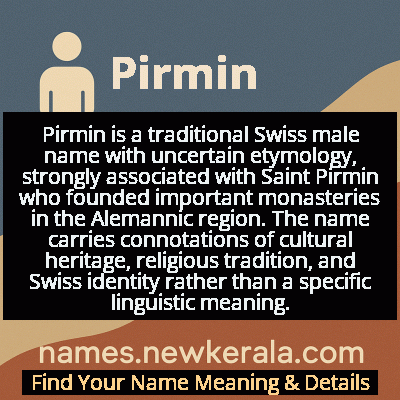Pirmin Name Meaning & Details
Origin, Popularity, Numerology Analysis & Name Meaning of Pirmin
Discover the origin, meaning, and cultural significance of the name PIRMIN. Delve into its historical roots and explore the lasting impact it has had on communities and traditions.
Name
Pirmin
Gender
Male
Origin
Swiss
Lucky Number
7
Meaning of the Name - Pirmin
Pirmin is a traditional Swiss male name with uncertain etymology, strongly associated with Saint Pirmin who founded important monasteries in the Alemannic region. The name carries connotations of cultural heritage, religious tradition, and Swiss identity rather than a specific linguistic meaning.
Pirmin - Complete Numerology Analysis
Your Numerology Number
Based on Pythagorean Numerology System
Ruling Planet
Neptune (Ketu)
Positive Nature
Intuitive, analytical, spiritual, and inquisitive.
Negative Traits
Secretive, reserved, aloof, and can be overly critical.
Lucky Colours
Green, yellow.
Lucky Days
Monday.
Lucky Stones
Cat’s eye, moonstone.
Harmony Numbers
1, 5, 6.
Best Suited Professions
Scientists, researchers, spiritual leaders, detectives.
What People Like About You
Depth of knowledge, analytical skills, spirituality.
Famous People Named Pirmin
Saint Pirmin
Monk and Missionary
Founded Reichenau Abbey and multiple monasteries, Christianized Alemannic territories
Pirmin Zurbriggen
Alpine Ski Racer
Swiss Olympic gold medalist and World Cup champion, one of Switzerland's most successful ski racers
Pirmin Schwegler
Footballer
Swiss professional footballer who played for Eintracht Frankfurt and the Swiss national team
Pirmin Meier
Author and Historian
Swiss writer known for historical novels and biographies focusing on Swiss cultural figures
Name Variations & International Equivalents
Click on blue names to explore their detailed meanings. Gray names with will be available soon.
Cultural & Historical Significance
The name embodies Switzerland's medieval monastic heritage and the spread of Christianity through the Alpine regions, making it a symbol of cultural preservation and religious tradition in Swiss history. Throughout centuries, Pirmin has maintained its regional character, rarely spreading beyond Alemannic-speaking areas, which reinforces its identity as distinctly Swiss-German. The name represents the intersection of religious mission work, educational foundations, and cultural identity that characterized much of Switzerland's development during the medieval period, serving as a living connection to the nation's deep historical roots.
Extended Personality Analysis
Individuals named Pirmin are often perceived as grounded, reliable, and deeply connected to their cultural roots. They typically exhibit a strong sense of tradition and stability, combined with practical wisdom that makes them excellent problem-solvers and trusted advisors. Their personality reflects the name's monastic origins through qualities of introspection, perseverance, and quiet determination. Pirmin's tend to be methodical in their approach to life, preferring careful planning over impulsive decisions, which often leads to success in long-term endeavors.
They value community and heritage, frequently showing interest in history, culture, or preservation of traditions. While they may appear reserved initially, they possess deep loyalty to family and friends and demonstrate remarkable resilience in facing challenges. Their combination of traditional values with practical intelligence makes them both respected leaders and dependable team members in various professional and personal contexts. The name suggests someone who builds lasting foundations rather than seeking temporary achievements, embodying the steady, enduring qualities associated with Swiss culture and the monastic traditions from which the name originates.
Modern Usage & Popularity
In contemporary times, Pirmin remains a distinctly Swiss name with moderate but stable usage, primarily in German-speaking cantons of Switzerland. While never achieving widespread international popularity, it maintains a steady presence as a traditional choice that honors Swiss heritage. The name experienced a slight resurgence in the late 20th century, likely influenced by the fame of ski champion Pirmin Zurbriggen, which brought the name to broader public attention. Today, it's considered a classic rather than trendy choice, often selected by parents seeking to maintain cultural connections or honor family traditions. Its usage remains concentrated in Switzerland and neighboring southern German regions, with minimal adoption in other countries. The name's stability reflects its strong regional identity and resistance to passing naming fashions, positioning it as a meaningful cultural marker rather than a fashionable statement.
Symbolic & Spiritual Meanings
Symbolically, Pirmin represents foundations, spiritual guidance, and cultural continuity. The name evokes imagery of monastic stability and the enduring power of tradition, symbolizing how ancient wisdom can provide grounding in modern life. It carries connotations of bridge-building between past and present, much like Saint Pirmin connected pagan and Christian traditions in his missionary work. The name also symbolizes Alpine resilience—the ability to withstand challenges while maintaining core values and identity. In a metaphorical sense, Pirmin represents the quiet strength found in heritage and the importance of preserving cultural memory. It suggests a person who serves as an anchor for their community, providing stability and wisdom drawn from deep historical roots. The name embodies the concept of stewardship—caring for traditions and knowledge to pass them to future generations while adapting them to contemporary contexts.

